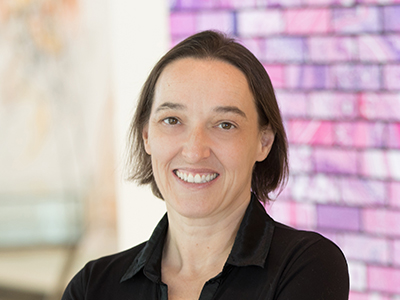
October 29, 2020: The Koch Institute shares its sorrow with the MIT and scientific communities over the news that Professor Amon has passed away at age 53 following a two-and-a-half-year battle with ovarian cancer. Our thoughts are with her family, friends, colleagues, and trainees.
Aneuploidy, or an abnormal number of chromosomes in a cell, is a hallmark of cancer and seen in 90% of all solid human tumors. The Amon Laboratory was focused on understanding how aneuploidy contributes to tumorigenesis.
The group investigated how aneuploidy can cause both slow proliferation and poor disease outcome. Testing the hypothesis that aneuploidy causes resistance to cancer treatment, they found that single chromosome gains lead to increased resistance to frontline chemotherapeutics cisplatin and paclitaxel. Furthermore, G1 cell cycle delays, like those seen in aneuploid cells, are sufficient to increase chemotherapy resistance in cells that are not aneuploid. Mechanistically, G1 delay increases resistance to cisplatin and paclitaxel by reducing their abilities to damage DNA and microtubules, respectively. The researchers also found that aneuploidy correlates with slowed proliferation and drug resistance in the Cancer Cell Line Encyclopedia data set, indicating clinical relevance for these findings. Their results suggest that a general and seemingly detrimental effect of aneuploidy—slowed proliferation—provides a selective benefit to cancer cells during chemotherapy.
Moreover, the Amon group investigated how aneuploidy arises in the first place, given the seemingly contradictory observation that chromosome mis-segregation is frequent in cancer, yet cancer cells harbor relatively few mutations in genes required for accurate chromosome segregation. Seeking to understand what then mediates chromosome mis-segregation in cancer, the researchers examined the importance of the tissue environment for chromosome segregation, comparing chromosome segregation fidelity across several primary cell types in native and nonnative contexts. They discovered that epithelial cells have increased chromosome mis-segregation outside their native tissues, and showed in organoids that tissue architecture, specifically integrin function, is required for accurate chromosome segregation. Tissue architecture appears to enhance the correction of merotelic microtubule-kinetochore attachments, especially important for maintaining chromosome stability in the polyploid liver. These data raise the possibility that disruption of tissue architecture could underlie the widespread chromosome instability across epithelial cancers, and the group worked to determine the mechanism whereby tissue architecture increases chromosome segregation fidelity.
Search PubMed for Amon Lab publications
Contact Information
Erica Burds, Administrative Assistant
(617) 258-6559
ericarie@mit.edu
